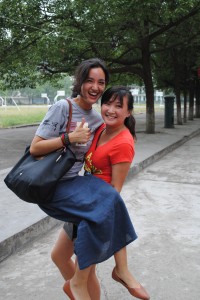Before I began teaching, I absolutely hated chalk. Not just the awful screechy sound it can make on the blackboard (which I surprisingly haven’t heard once this summer), but its ability to linger – in the air, on skin, on tabletops. It has the uncanny ability to infiltrate zipped bags, breach the secret spaces between notebook pages, and invade nostrils and lungs in a matter of seconds; in short, chalk is a nuisance.
At first, I experienced major struggles with my new teaching tool. For a while, the words I wrote on the board were constantly lopsided and wobbly; I couldn’t quite figure out how not to make them look as if an arthritic 87 year old had written them. I can’t count the number of times I’ve snapped a piece of chalk mid-sentence, much to the amusement of my students; or the number of times that, while clearing the board, I’ve dropped the sponge eraser on myself, resulting in obnoxious white stains down the front of my shirt. It took a while, but after several weeks of teaching, I managed to make peace with this powdery fiend. I now know the perfect length of chalk for optimal use – not long enough for the stick to break, not short enough for the tips of my fingers to come uncomfortably close to the board. Picking up a piece of chalk has become as familiar as eating with chopsticks.
I realize now that chalk is an elusive substance; it never really goes away. Just when you think that the board is wiped clear of all powdery traces, you see that the chalk has simply been transformed into tiny particles of dust, which are now resting on your shoes. This realization is what led me to draw the following parallel between chalk and memory. Memory, like chalk, undergoes a series of transformations – time is the main culprit here, inserting things that never happened into your most treasured memories, mutating words that were said, adding and taking away bits and pieces. This is inevitable. But most memories don’t just go away. They change a little over time – that’s all.
I know that my memories from Jishou will always remain with me. The way that I remember things now, only one day after leaving the city, can be compared to a full-length stick of chalk; solid, unblemished, easy to hold onto. But I also know that, as time goes by, the memories will begin to chip and break, disintegrating into smaller fragments. Then, they will pulverize, until only discontinuous snippets remain – moments, smiles, words. But they will still be there, nonetheless…and this is what I have come to accept.
Leaving Jishou was as difficult as I’d imagined, if not more so. Snapshots of the last day: bulging suitcases, apartment decorations. Stifled tears. Tears on tears on tears. Blurry waving figures outside a train. Nostalgia. Despite the sadness I felt on departure, I know that I have left China with the sense of accomplishment that I set out to achieve. I hope to go back to Jishou – whether in one year, or ten years, I don’t know. One thing I am sure of is that my memories of this summer are not going anywhere.
The chalk is here to stay.


You must be logged in to post a comment.